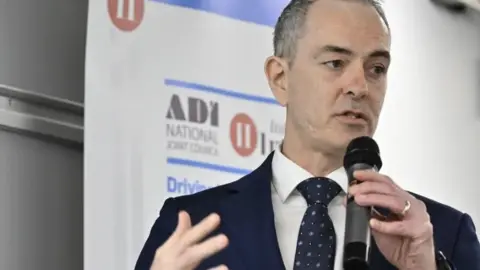Driving instructors say rising prices are fair - but learners can't keep up
 Faustina Kamara and Keith Rose
Faustina Kamara and Keith RosePaige Williams is desperate to pass her driving test.
Her three-year-old son sometimes has "meltdowns" on public transport, where he might scream, cry or throw himself on the floor, she says. She just wants to be able to visit family and go on day trips more easily.
But the 28-year-old single mum, from Barnsley, is having to drastically cut back on how much she spends on food, gas and electricity to be able to afford her £35-an-hour lessons, which she's been having since September.
"It's literally scrimping and scraping to be able to manage to get one lesson a week," she says.
As the cost of driving lessons continues to rise alongside an already high cost of living, experiences like Paige's may be becoming increasingly common.
The BBC has spoken to more than a dozen learners and parents of learners who say they're frustrated by how much they have to pay - and also to instructors who argue that the prices are justified.
Driving instructors can charge what they like, and the DVSA does not release official statistics on average lesson costs.
But a DVSA survey completed by more than 5,000 approved driving instructors (ADIs) in September shows how prices have shot up in recent years.
In the survey, the most common price bracket for an hour lesson was £36 to £40 per hour.
Just 31.5% of driving instructors said they charged £35 or less per hour - that number had halved since the DVSA's June 2023 survey.
While 20.8% said they charged more than £40 an hour - nearly triple as many as in June 2023.
For many people, driving is essential for taking their kids to school, going to work or carrying out caring responsibilities.
Public transport might be unaffordable, inaccessible or simply not available for some people.
Two-thirds of people in Great Britain who commute to work drive in, and 45% of five-to-10 year olds are taken to school by car, Department for Transport figures from 2023 show.
Faustina Kamara, a 23-year-old in Birmingham, needs a licence for her dream job - being a runner in the media industry.
But the £60 cost of her two-hour driving lessons means she's only having them once a fortnight, which isn't as frequently as she'd like, and means it will delay when she can take her test.
She says she'd love to have lessons weekly but it would mean she'd have to cut back on spending money seeing her friends.
Other people also say that the high cost of driving lessons means it's taking them longer to learn to drive.
Rather than having the two lessons a week she would have liked, Sandra Onuora, a 30-year-old civil servant in Newcastle, had three per month until she passed her test in March.
"That was all I could afford," she says. And even then, "I had to take a lot of money from my savings" for her £39-an-hour lessons, she adds.
Because she had to space out her lessons more, she had to wait longer until she felt ready to take her test.
She'd spend hours every week travelling between her home, her son's childminder's and her office, taking six buses every weekday.
"It was a rough year," says Sandra. She would return home "so exhausted".
 Sandra Onuora
Sandra OnuoraAnd just as driving lessons become more expensive, some learners are also finding they're having to take more of them.
That's because of a huge practical test backlog, which means learners are having to take lessons for longer to keep up their skills.
Keith Rose hasn't been able to book a driving test near where he lives in Bridgwater, Somerset, for his 17-year-old son, Brandon.
The best option he could find is an hour's drive away in Newport, Wales, and isn't until September.
Keith says that his son is ready to take his test, but will need to keep taking lessons at a cost of £76 for a two-hour session to maintain his skills.
"We're being forced into spending money that we don't need to," Keith says.
Transport Secretary Heidi Alexander has acknowledged that waiting times for tests are too long and pledged to reduce the average waiting time for a driving test to no more than seven weeks by summer 2026.
Instructors say that they have little choice but to charge these kind of rates if they want to make a profit.
"Prices for driving lessons are where they should be, having been probably under-priced for many years," says Stewart Lochrie, the owner of a driving school in Glasgow and chair of the Approved Driving Instructors National Joint Council (ADINJ).
"I think the price was overdue a reset."
Stewart notes that the UK's more than 41,000 approved driving instructors are having to pay more for the expenses associated with their jobs like buying or leasing a car, fuel, insurance and maintenance.
"We have costs to cover as well and if the things that we need to run our business go up, then our prices will have to go up as well," he says.
 Pro Vision Photography Ltd
Pro Vision Photography LtdThe rising price of lessons "isn't really translating to a pay increase in our pockets," adds Terry Edwards, a driving instructor in Ashford, Kent.
His expenses include around £280 a month on fuel, £135 on insurance and £440 on car payments.
Other costs include servicing, repairing and cleaning his car.
Terry charges £39 an hour, but offers a discount for buying in bulk. While customers "don't generally push back" against his prices, some "try and be a bit cheeky" and ask for discounts, he says.
For Amy Burnett, a pharmacy advisor in Glasgow, the prices are so high that she's avoiding learning for the time being. The only instructors she'd found with availability charge between £50 and £60 an hour, she says.
"I'm living pay cheque to pay cheque as it is," the 22-year-old says.
But she sees being able to drive as an investment in her future - she'd have more freedom and she's had to limit her previous job searches to roles accessible by public transport, she says.
Amy hopes to pass her test by the time she's 24 - if she can find a more affordable instructor with availability in her area, she says.
Paige, the mum in Barnsley, is sure her frugality will be worth it in the end. Being able to drive would make it much easier for her to return to work, she says.
And it would make journeys with her son much less stressful, she says. Most of all, she wants to take her two children to the seaside.
"It'd be so good for my son Ronald, with his sensory needs," Paige says. "Getting to go on the little arcade rides and seeing his little face would be lovely."
